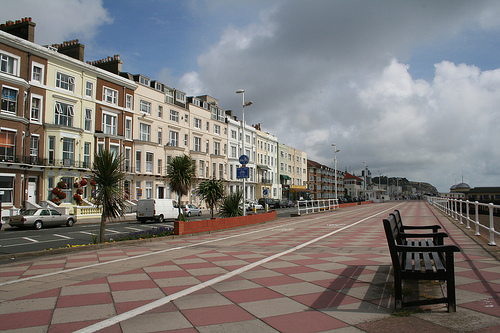Protectionism: A Prisoner’s Dilemma?

Photo by: Kyle May
In game theory there is a “game” called the “Prisoner’s Dilemma.” In the game, two players have been arrested. If they cooperate and neither “rats” on the other, they will both go free. If one “rats” on the other, he receives a light penalty while the forsaken prisoner receives a stiff penalty. If they both turn on each other, they both get a moderate penalty. 1 The basic lesson? Each of the parties would be best served if neither of them participated, but least served if they don’t participate while the other party does.
A real-world example of this could be a sporting event: say something interesting happens and a spectator stands up to get a better view. This causes more and more people behind him to stand up, just to get the view they had before. At the end of this process, everyone essentially has the same view they had before, but now they’re exerting the effort of standing. If they’d all just remained seated in the first place, they’d all be a bit better off. 2
What Does This Have To Do With Economics?
People say that our current financial crisis will not be as bad as the Great Depression because “we make much better decisions now.” We know better than to resort to things like high interest rates and protectionism. We won’t make the mistakes of Smoot-Hawley again. But history shows that, in general, we were actually smart enough to know that at the time. While economists rarely agree on anything, they were universally opposed to the Smoot-Hawley Tariffs.3 Yet they happened anyway.
Meanwhile, looking to the present, we see signs of the same kind of thinking again. We know better than to adopt protectionist policies, but the new administration is already discussing whether to “punish” China with tariffs due to their manipulation of their currency value.4 This justification seems particularly unrealistic as we are creating 0% interest rates and pondering bailing out our auto-makers. Bad decisions are often deemed bad only in retrospect. People don’t plan to make bad decisions, they make what they think are good decisions in the vain pursuit of “fairness,” a concept that is ephemeral and non-existent.
So are we faced with a Prisoner’s Dilemma? Will it deal a crushing blow to our economy if we do not “fight” other countries protectionism with our own. History has little to say, except that free trade has usually been good for all the parties involved. If we can buy something cheaper than we can produce it ourselves, then we are better off than if we make it at an inflated price. It may not necessarily be the case that we need to follow suit if everyone else in the world starts pursuing protectionist policies.
How Does This Affect Me?
As Geithner and his fellows debate whether or not to implement tariffs on China, the most likely action item for you is to be very cautious. While many may be telling you that this recession will not rival the Great Depression, you can watch as we take the same steps that we’ve decried before, thinking that “things are different this time.” Almost any negative outcome is a possibility in the short and medium term, and it pays to have something that protects you in each case. In the short term, deflation seems to be a likely demon, but longer term inflation seems to be the opponent. Meanwhile, it’s difficult to know whether stocks can be expected to perform. Ultimately, it is pivotal that you develop an investing strategy that involves protecting yourself and optimizing for your personal situation.

















